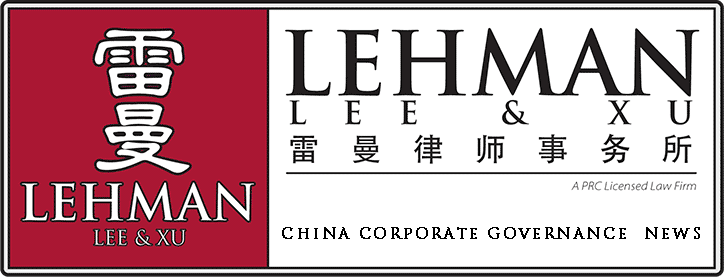

Attorney Edward Lehman, Managing Director of LEHMAN, LEE
& XU working 27+ years on the ground in mainland China.
Connect with Attorney Edward Lehman
 |
LEHMAN, LEE & XU China Lawyers |
China Corporate Governance News |
Sep. 17, 2015 |
 |
Attorney Edward Lehman, Managing Director of LEHMAN, LEE & XU working 27+ years on the ground in mainland China. Connect with Attorney Edward Lehman |
The China Corporate Governance News keeps you on top of business, economic and political events in the China. |
|
|
In the News |
Is a Chinese Economy Without Corruption Possible? |
At the end of 2012, China began a process that transformed its economy from a centrally planned system, mainly dominated by SOEs, to a socialist market, more opened to global businesses. The reform caused a Chinese long economic boom, which has undoubtedly widened prosperity and opportunities for hundreds of millions of people, but at the same time has been accompanied by a wave of corruption. This is due to the incompleteness of the reform, and the lack of an adequate legal framework and a culture of corporate governance. The latter has left the system vulnerable to power abuse and let individuals pursue self interests at the expense of others, creating anger among many factions of the population. A corrupt systemMain sources of corruption are the manipulation of insider systems, ineffective monitoring on the part of state representative of the Supervisory Board, deficient legal system, reshuffling of economic power instead of reducing magnitude of power, abuse of guanxi (Chinese word that means the personal network), new norms of social judgement and a lack of basic social values. Moreover, thinking from corporate perspective, except for the controlling shareholders, minority shareholders and other stakeholders are quite powerless in the governance scheme. The development of corporate governance in China is thus mainly a top-down approach and this well represents Chinese management practice, where employee need strong leaders who take decisions without leaving room for discussion. Finally, while the state has failed to enforce a balance of power among its institutions, there is also lack of support and cooperation from the top to transmit good corporate values all the way down the organisational ladder. A tough fightPresident Xi Jinping has launched numerous measures to fight this plague, even though he has to face many impediments. He knows that the main one to an effective anti-corruption campaign is the Communist party itself and its role in Chinese society; a campaign against corruption can only succeed if it is administered impartially by courts that are independent from the government. Something has certainly changed: according to official data more than 100,000 officials have been disciplined since the anti-corruption drive began and almost 13,000 have been found guilty in the first nine months of 2014 alone. Examples are the charging of Zhou Yongkang, the former head of China’s internal police, General Xu Caihou, once the military’s second-in-command, and the announcement of an investigation into Ling Jinhua, who was the senior aide to ex-President Hu Jintao. Also the recent case of almost 200 arrests over “rumour mongering” after the recent stock market moves make us think that change is occurring. All of them may be found guilty but many will inevitably suspect that they have been singled out just because on the wrong side of struggles within the Communist party. Is there a way out?President Xi efforts are notable but more is needed. He should establish a “new normal” not only as regards the economy but also in the way institutions work, and give officials incentives in order to challenge the power of the Communist party. A first step to achieve this would be establishing an independent anti-corruption commission, which has been promised. Another alternative could be what already done by Singapore, which has adopted a quite different method, increasing salaries by a substantial amount and so reducing the incentives for corruption. The court system has also to be changed from inside. Nowadays, it has a 99.9% – as estimated by the FT – conviction rate, further strengthening the impression that the legal system has much more to do with the desire for political social control than the search for justice. Probably the most relevant fact about this campaign is that now everyone does not want to take risks anymore because more concerned about being investigated for corruption, so slowing pace of investments and making some worry that without bribes the economy will stagnate, especially regarding luxury industries (according to a report by Bank of America Merrill Lynch, the anti-graft campaign could cost the economy more than $100bn per year and $135bn of lost economic activity). On the other hand, others argue that the anti-corruption campaign will ultimately make China’s economy more efficient and lower business costs. But unless China accepts that an independent legal system must stand above the authority of the Communist party, the notion of the rule of law will remain more a slogan than reality and significant results will not be achieved. China’s biggest social networks can be incredibly fertile ground for successful marketing to China’s growing consumer base. One aspect of social-media usage in China stands out compared with that of other countries: it has a greater influence on purchasing decisions for consumers in China than for those anywhere else in the world. Chinese consumers say they are more likely to consider buying a product if they see it discussed positively on a social-media site, and more likely to actually purchase a product or service if a friend or acquaintance recommends it on a social-media site. This is explained by a cultural twist where: Chinese consumers disproportionately value peer-to-peer recommendations, as the Chinese are more skeptical of formal institutions. Source: http://themarketmogul.com/is-a-chinese-economy-without-corruption-possible/
|
|
|
|
|
| Proud Member of |